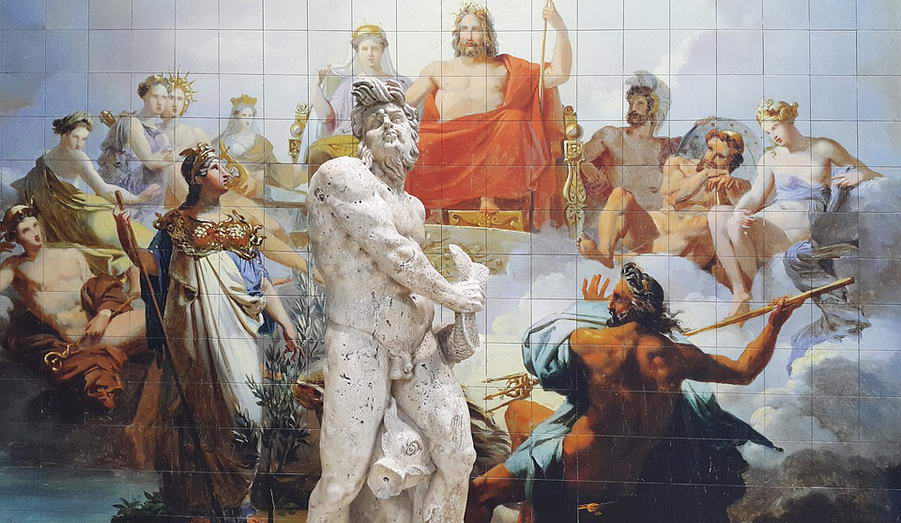Twelve Olympians or The 12 Olympian Gods of Mount Olympus are the major deities of the Greek pantheon, commonly considered to be Zeus, Hera, Poseidon, Demeter, Athena, Apollo, Artemis, Ares, Aphrodite, Hephaestus, Hermes, and either Hestia or Dionysus. They were called Olympians because, according to tradition, they resided on Mount Olympus.
Mount Olympus
Zeus, who formed the third line of gods after Uranus and Cronus, began to dwell on Olympus, ruling the universe from there together with his siblings and children. The Twelve great gods of the Greeks were known as the Olympians. They presided over every aspect of human life. The goddess Hestia (listed here in the second rank) was sometimes included amongst the Twelve.
First denoted merely as a mountain, Olympus took on an eternal connotation later. In a literal sense, it means a high mountain. Therefore, high mountains in Greece and Crete, as well as those in Anatolia such as Uludağ, were named Olympus. However, what actually comes to mind when one speaks of Olympus of countless peaks and observed what went on in the world. The palaces were made from bronze by Hephaestus, the blacksimtih god.
Zeus and the Olympians
The Olympian gods (“Theoi Olympioi“) presided over ever facet of ancient life and were often grouped according to their common functions. Zeus would sit on his golden throne, while gods organized festivities before him, and thus they led a happy life. Zeus is the god of sky and thunder. He is the child of Cronus and Rhea, and is the youngest of his siblings. He is married to Hera, although, he is known to have fathered many children with other women.Their food and drink were not like those mortals. They consumed ‘ambrosia’and ‘nectar’. Ambrosia meaning ‘immortal’, was a type of honey made of multiple flower essences. Thus, the gods who fed on this would remain youthful and remain immortal. Goddess Hebe would servet the drinks inside golden cups. Afterwards, Zeus commissioned Ganymede (son of King Tros of Troy) to serve the drinks. Apollo and the Muses would jollify the festivities with their instruments and songs.
Gods would dress up like people, become angry and sad, and suffer like them. They would engage in fights and sometimes would be injured too. Even thought their wounds hurt them, they would never kill them. Flowing in their bodie was not blood but a fluid called ‘ichor’. On one occation, Aphrodite and Ares hd deep wounds and were writhing in pain, yet they did not die. The god Apollo applied a salve on their wounds and healed them.
There weren’t always festivities in Olympus, at times there would be fights too. One time Hephaestus the blacksmith god enraged Zeus and Zeus threw him down from Olympus and crippled him. On another occasion some gods plotted a conspiracy against Zeus. This outraged Zeus and he punished Apollo and Poseidonby condemning them to work in the service of the king of Troy for one year.
Gods would never go against the order of Zeus, the absolute ruler of Olympus.He was the head and king of gods and owner of the heavens. His order was law and his thunderbolts the symbol of his absolute dominion with which he would hit when angry.Although all the palaces of gods were in Olympus, Hades did not live in Olympus because he ruled the underworld. Beside Zeus, Hera, Hestia, Apollo, Artemis, Athena, Aphrodite, poseidon, Ares, hermes and Demeter, there were also secondary gods in Olympus. Of these deities, the Muses, the divine Chrites and the Horae would entertain the Olympians with their songs. The mother of Horae Themis, would sit near the throne of Zeus and spread justice. The gods would sometimes be distinguised as humans and go among them. As mentioned before, Zeus ruled the world from Olympus together with his siblings and childer. Altogether, these gods were known as the twelve gods of Olympus.
Now the Greek and Latin names of these will be provided along with the natural powers they represented. And afterwards, we shall discuss the gods of Olympus one by one.
The 12 Olympian Gods of Mount Olympus (Greek and Latin names)

